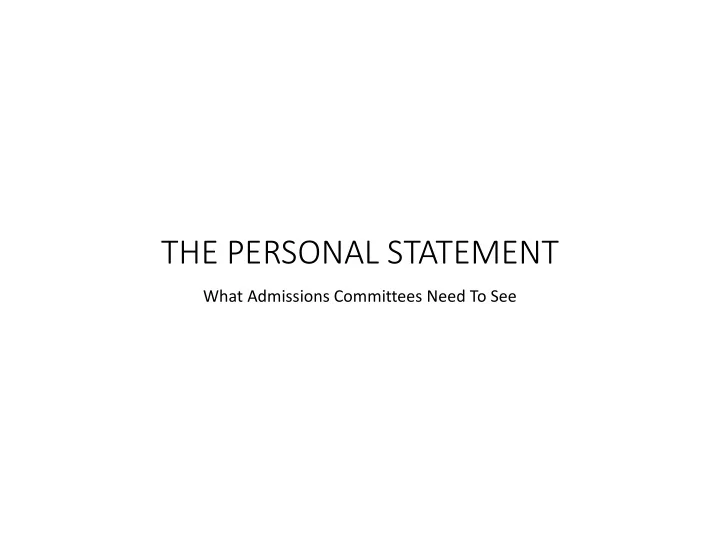

THE PERSONAL STATEMENT What Admissions Committees Need To See
THE BASICS LENGTH (including spaces): • Medical: 5,300 characters • Dental: 4,500 characters DEADLINE The Personal Statement is a main part of the online application, so it must be PROOFED and LETTER PERFECT by the time the student applies (June 2018) This usually requires SEVERAL drafts.
DOs AND DON’Ts A Personal Statement IS: A Personal Statement is NOT: • About YOU, not your parents or other mentors • A literary exercise • Proving to the school that you’ve earned a seat • A reiteration of your resume/experiences in their upcoming class. (Every applicant has • Full of quotes or obscure references deeply-felt reasons why they WANT to be a doctor or dentist. Show what you’ve DONE to • An essay on the state of health care and how demonstrate this.) you’ll change it • Written in a simple, conversational tone. BIG WORDS do not impress Admissions Committees (other than technical references regarding specific research.)
Things to Definitely Avoid • Phrases like “I think…,” “I feel…,” “I hope…,” “I intend…,” “It seems…,” • Long, complicated sentences • Contractions • The passive tense • Example: Harry ate six shrimp at dinner. (active) At dinner, six shrimp were eaten by Harry. (passive) • Adjectives like “exciting,” “interesting,” “fascinating,” • Feelings • Empty phrases (those that do not convey meaning. Example, “It was a dark, stormy night…” • Directly insulting the person who is reading your statement. Example: “Today’s physicians are incapable of empathizing with their patients.”
Key Components In general, if candidates discuss the following questions, they will compose an appropriate personal statement: • Who you are? • What are your career plans? • Where do you hope to have an impact? • When did your interest in medicine develop? • How have you demonstrated your interest and commitment to a career in medicine? • What makes you a unique candidate? Brenda Lee, assistant dean for medical education and student affairs at the University of Rochester School of Medicine and Dentistry
All Writing Is Reader-Centered And Purpose-Driven • Who Are You? 1. 1. Who a are t the r reader ers h here? e? ‾ An Admissions committee member or administrative screener. 2. 2. What i is t their j job? To make yes/no decisions about whether or not you get an interview to their medical school. 3. 3. What d do t they w want t to k know? w? They want to know what distinguishes you from the other thousands of applicants who are also smart, well-educated, and interesting. 4. 4. What i is t the p purpose of y your writing? To show this committee that you are more than a collection of admirable statistics—that you are a person worthy of cultivating, of educating, of eventually calling a colleague. 5. 5. How d w do y you f fulfi fill t this p purpose? By telling the stor ory of yourself.
Show, Don’t Tell Demonstrate, Don’t State. Rel elate, e, d don’ n’t Pontificate. Do not rehash your In other words, give the resume. Instead, choose a few reader the "hands-on" tour— experiences that were particularly you think that you’re diligent, meaningful and/or can illustrate hard-working, ambitious, qualities that you want the compassionate, etc., then Admissions Committee to know. SHOW the reader this through Tell the story (what happened). an experience in your life that Tell what you learned (what you got demonstrates this quality. out of it). Don’t just use the words; they’ve got no reason to Tell how what you learned applies believe you! to success in medical or dental school (why it matters).
Avoid Clichés And Sounding Like a Savior! Phrases like "less fortunate" and "down trodden" are patronizing. Instead, talk about wanting to help people with limited access to health care or setting up neighborhood clinics so that affordable health care is available to more people.
Keep It Positive Do not write negatively about yourself, your profession or anyone else! If you need to explain a dip in grades, do so briefly, objectively and without excuses. Do not belabor whatever trauma/situation caused the problem.
Be Truthful… And don’t exaggerate ! “I was first author because I did all of the research by myself.” “I assisted doctors with medical procedures.” “I speak Spanish/French/ whatever fluently.”
Most Important Rule Say nothi hing ng in your personal statement that isn't directly relevant to helping an admissions committee make a yes/not decision about your merit as a graduate student. This includes quoting other people (why should they care what Einstein or Luke/Mark/John ever said? What does it have to do with your ability to succeed?) Don’t wax eloquently about your parent(s) or spend time talking about someone else’s wonderful qualities! Remember that EVERYTHING in your Personal Statement—and the rest of your application—is subject for discussion at the interview.
Recommend
More recommend